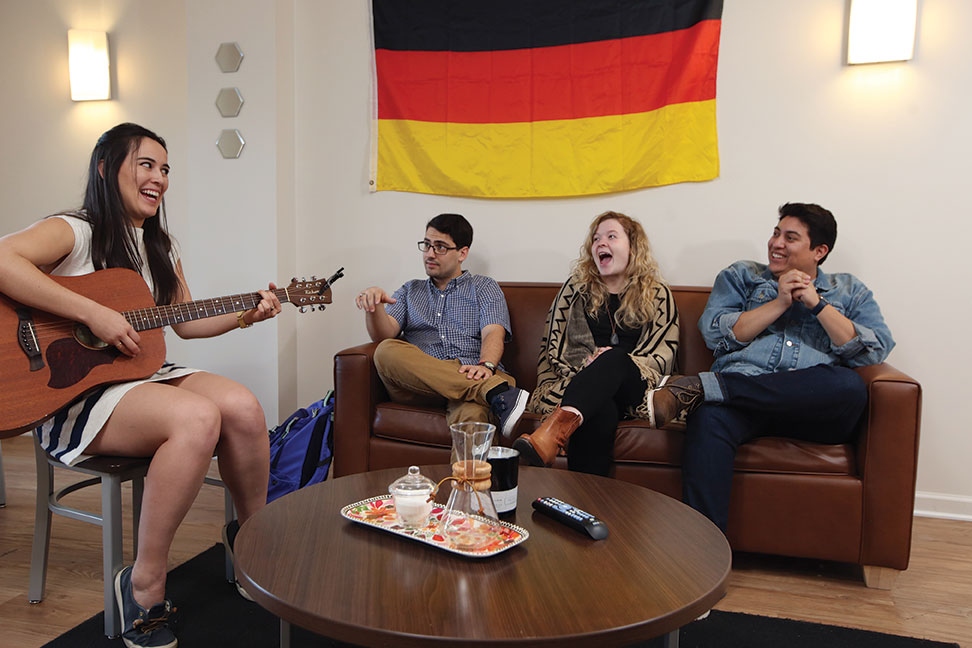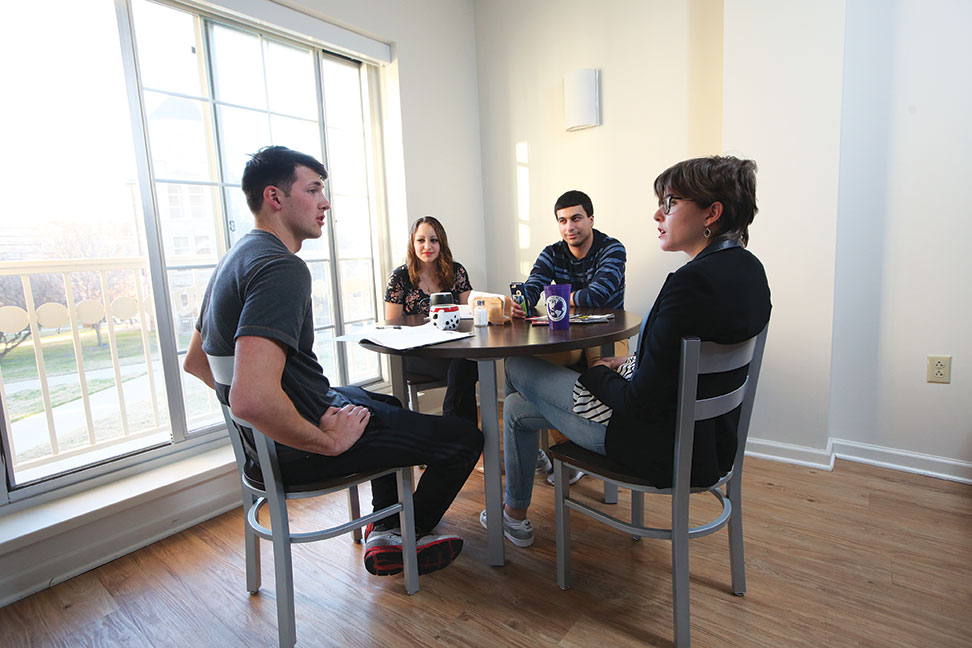Life in Immersive Language Houses
Students in French and German say the new houses in Mabee Hall help with language acquisition and promote campus diversity.

Living in the German Language House forces students to speak -- or sing -- in a new tongue.
Life in Immersive Language Houses
Students in French and German say the new houses in Mabee Hall help with language acquisition and promote campus diversity.
In the second-floor hallway of TCU’s Mabee Hall, flags from France, Germany, Switzerland as well as other countries hang from the ceiling. The flags represent the countries where a majority of the population speaks French or German.
For students interested in French and German, two language houses on campus provide an immersive opportunity.
When Romel Shearer, a senior French and music major, returned from a study abroad program in southern France, he looked for an outlet for his engagement with French culture and language.
“I wanted to find something that could come as close to that as possible — in the sense that I could communicate and… better my skills,” said Shearer, one of seven students living in the French house at Mabee.
“TCU really needs a place like the language houses in order to spread culture and… promote diversity.”
Gabriela Ruiz-Roehrs
For Jean-Paul DuBos, a sophomore political science major, the French house provides a space to practice the language without the pressure of class. “It’s just nice because I can actually practice [French], confidently, outside of class, and I don’t feel weird about it.”
Marie Schein, instructor of French and adviser for the French house, said the key to success in the language houses is the willingness of the residents to participate. “Students need to have that desire and need to have the intention to bring something to the table, to learn from each other and to really become part of this language and culture community.”
![]()
Native Speakers in the House
This semester, a French native is living in the house too. Pauline Demoustier is the French house tutor and coordinator. She is at TCU as part of an internship for Paul Valéry University of Montpellier in France.

Pauline Demoustier.
For the student-residents — who are required to talk in French at least three hours a week — having a native speaker has made a difference. Shearer said Demoustier helped him make his French more conversational rather than academic.
For DuBos, Demoustier provided a lot of motivation. “If you try to make some sort of a study group with one of your friends in French class, you’re just going to break down and turn to English,” he said. With Demoustier, student residents go grocery shopping or do other everyday activities while talking in French.
Although it is easy to slip back into English, regular scheduled activities help French house residents speak the language as often as possible. For example, every Tuesday they either watch a French movie or play a game. The group also has dinner together once a week. They cook a French meal a couple times a month too.
![]()
Benefits of Immersion
At the German house, student residents speak the German at different levels of fluency; thus the immersive living experience helps the beginners improve their language skills more quickly.
Emily Fowler, a freshman political science major with international emphasis, moved into the German house in the fall. She said it was hard to adapt at first but living with more fluent speakers has been advantageous.
“I’ve noticed that immersion makes it so much easier to learn rather than just sitting in a classroom situation,” said Fowler. “I can understand German a lot better than the people in who are in my class that just weren’t around that.”
Similar to French house residents, the German students participate in events that provide opportunities to practice the language and learn about Germanic culture. Each week, student residents hold a conversation hour, where they encourage each other to use the German they know regardless of level of fluency.
Scott Williams, associate professor of German Studies, said the house provides experiences classroom instruction. It’s an “opportunity to, in their daily life, to practice [the language],” he said. “It’s a big difference if you can walk out the door from your classroom and still be in an environment where German is spoken.”
For Micah Lambert, a senior history major, the German house has been an important part in his language studies. But, he said, the language houses play a bigger role for TCU.
“I think actual houses that are devoted to a language and a culture is extremely important,” said Lambert. “It’s part of college. You get to experience new things. Living in a house with someone from Germany and talking German or… someone French, it’s definitely different and it eye-opening.”
For Gabriela Ruiz-Roehrs, a sophomore economics and political science major, the language houses help with inclusion.
“TCU really needs a place like the language houses in order to spread culture and… promote diversity.”
Ruiz-Roehrs, who is also the German house coordinator, hopes to see expansion in both houses and maybe new house openings for other houses.
“At the heart of this space…there’s a greater purpose of community building, and that touches the entire campus,” said Schein. “The philosophy of the language house, the activities, the commitment, the programs all contribute to develop global citizenship right here on campus.”

Conversation practice in the French Language House at TCU’s Mabee Hall.

Your comments are welcome
Comments
Related reading:
Features
Discovering Global Citizenship, or How to Help a Vanishing Species
TCU’s award-winning international education program is making an impact on South Africa’s endangered rhinos.
Campus News: Alma Matters
Pardon my French
Modern Languages professor Joshua Blaylock links TCU with elite festival of films for academic discourse.